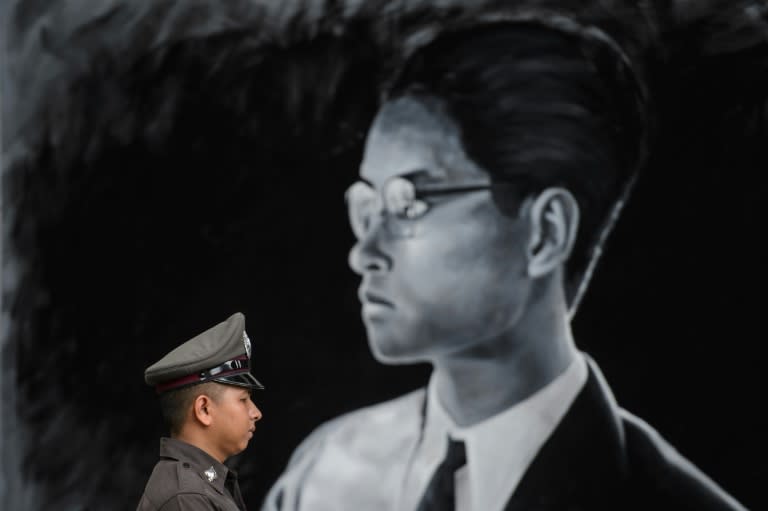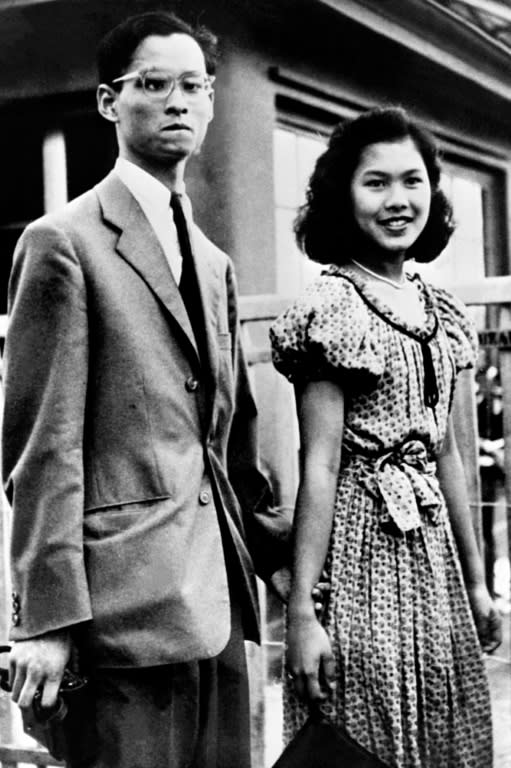The turbulent reign of Thailand's late King Bhumibol
Thailand's late King Bhumibol Adulyadej was the world's longest ruling monarch when he died last year aged 88. Revered by the Thai public, he was widely seen as a symbol of stability during a seven-decade reign punctuated by violent protests and coups. He will be cremated on Thursday as part of a lavish five-day funeral led by his son, King Maha Vajiralongkorn, who is yet to command the same devotion from the Thai public as his father. Here are some key dates during the reign of Bhumibol, Rama IX of the Chakri dynasty. - June 9, 1946: Bhumibol ascends the throne aged 18 after his brother is shot dead in mysterious circumstances at the Royal Palace in Bangkok. - May 5, 1950: After finishing his studies in Switzerland, he returns to Thailand for his formal coronation a week after marrying his cousin Queen Sirikit. - October 1973: Scores are killed when a military crackdown on student protests. The king makes a first major political intervention, prodding Thailand's then dictator into exile and later appointing a new premier. - October 1976: Right-wing royalist militias kill dozens of leftist students protesting the return of Thailand's exiled dictator. The massacre prompts a coup, which overthrows democracy and returns the military to power. Bhumibol later approves the coup, cementing his status a bulwark of anti-Communism in Southeast Asia. - May 1992: Dozens of pro-democracy protesters are killed during "Black May" as mass rallies return to Bangkok's streets. Junta leader General Suchinda Kraprayoon assumes the prime minister's post. The king summons the general and the pro-democracy leader to the palace and admonishes them in a dramatic televised effort to reconcile the two sides. Suchinda resigns. - October 11, 1997: The king signs Thailand's 16th charter into law, the most progressive to date and a major development for political reform and democracy. - April 2006: Thailand holds inconclusive elections that paralyse the government of Prime Minister Thaksin Shinawatra. Amid the deadlock, the king chastises the Supreme Court for failing to take action and the election is soon invalidated. - September 19, 2006: A bloodless coup ousts Thaksin while he is at the UN General Assembly. The coup sparks a decade long political cleavage between Thaksin's mainly rural supporters and the arch-royalist Bangkok elite in the military, business and bureaucracy. - August 2009: The king makes a rare speech, broadcast on national television and radio, warning that the country could collapse if its feuding political factions do not unite. - September 2009: The king suffers the first of many health scares as he is admitted to hospital with a lung infection. He is in and out of hospital for the next several years as his health declines. - April-May 2010: Bhumibol remains largely silent during a military crackdown on pro-Thaksin "Red Shirt" supporters that leaves more than 90 people dead and hundreds wounded. - May 22, 2014: Thai army seizes power again, toppling the government of Yingluck Shinawatra, Thaksin's younger sister. The palace again formally endorses the coup. - May 5, 2015: The monarch makes a rare public appearance as he attends 65th anniversary celebrations of his coronation. In December 2015 he makes one of his last public appearances. - October 9, 2016: A month after being treated for a "severe" blood infection, the king's doctors warn his health is poor. - October 13, 2016: King Bhumibol dies at 3:52 pm local time plunging Thailand into mourning. His only son Maha Vajiralongkorn inherits the throne and becomes Rama X.





